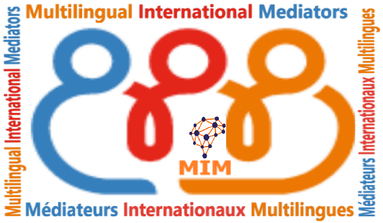La défense de la santé mentale comme médiation humanitaire
Qu'est-ce que la médiation humanitaire ?
▶ La médiation dans le cadre humanitaire dépasse largement la simple résolution de conflits ou de différends interpersonnels. Elle ne se résume pas à « faire la paix » entre deux parties opposées. Dans les contextes d’exil, de guerre, de précarité et de marginalisation, la médiation devient un acte de reconnaissance, une pratique de traduction entre mondes disjoints, un outil de réparation symbolique.
▶ Dans les contextes de guerre, de déplacement forcé et de violence institutionnelle, la santé mentale devient un espace de lutte et de résistance. Ce n’est pas seulement une question médicale, c’est une question politique, sociale et profondément humaine.
▶ Notre approche considère la santé mentale comme une passerelle entre l’expérience intime de la souffrance et les réalités collectives qui la provoquent ou l’amplifient. Elle est aussi un levier d’action dans des contextes où les droits fondamentaux peuvent être bafoués.
Un pont entre le soin et la justice
▶ La souffrance psychique n’apparaît pas dans le vide. Elle est souvent liée à des violences structurelles : guerre, torture, discrimination, enfermement, précarité, errance, rejet administratif. Dans ce contexte, le soin ne peut pas être neutre. Il devient un acte de reconnaissance, un geste de réparation, une manière de rendre audible ce que les institutions taisent ou disqualifient.
▶ En défendant l’accès aux soins psychiques pour les personnes vulnérables (déplacées, réfugiées, migrantes), nous défendons aussi leur droit à être vues, écoutées, respectées. Le soin devient alors une forme de médiation entre la personne et le système qui l’a blessée, rejetée ou ignorée.
▶ Lorsque des personnes sont réduites à des « statuts », la médiation permet de rétablir leur singularité. Elle redonne une place à la parole, à l’histoire, aux aléas de la vie, aux silences aussi. Elle crée les conditions pour que la personne soit à nouveau sujet, et non objet d’intervention. C’est un acte de dignité partagée, qui refuse la déshumanisation.
Sortir la santé mentale de l'ombre humanitaire
▶ Dans les parcours de migration, les personnes se trouvent souvent confrontées à des institutions qui ne comprennent ni leur histoire, ni leur langage, ni leurs réactions psychiques. La médiation permet alors de faire le pont entre des subjectivités blessées et des systèmes souvent rigides. Il ne s’agit pas de négocier un compromis, mais d’interpréter l’indicible, de rendre intelligibles des souffrances que les cadres administratifs ou médicaux peinent à accueillir.
▶ Dans de nombreuses interventions humanitaires, la santé mentale reste reléguée au second plan. Elle est souvent réduite à des protocoles standardisés, à une réponse de seconde intention, voire à une simple annexe des soins médicaux. Ce traitement marginal contribue à invisibiliser les effets psychiques durables des violences.
▶ Nous plaidons pour que la santé mentale soit intégrée dès la conception des réponses humanitaires, avec des moyens suffisants, des professionnels formés et une véritable attention portée à la subjectivité des personnes. Le soin psychique ne peut pas être externalisé ni réduit à un outil d’adaptation aux normes du pays d’accueil.
Une pratique qui transforme les rapports de pouvoir
▶ Nos interventions ne visent pas à adapter les personnes aux systèmes, mais les systèmes à la singularité de l'humain. Elles cherchent à créer des espaces où elles peuvent retrouver du pouvoir d’agir, une narration propre, une dignité. Cela suppose d’écouter les récits, de respecter les silences, d’accepter la complexité des histoires de vie.
▶ En ce sens, la santé mentale devient un langage intermédiaire. Elle peut faire entendre ce que les mots du droit, de l’administration ou de la politique ne savent pas dire. Elle agit comme médiation entre des mondes disjoints : celui du dialogue intérieur et celui de la parole extérieure.
Une éthique de la relation
▶ Dans les contextes de violence extrême ou de déplacement, les liens de confiance sont souvent détruits. La médiation contribue à restaurer une forme de sécurité relationnelle, condition préalable à tout travail de soin. Elle ne cherche pas à résoudre un « problème », mais à ouvrir un espace relationnel où les malentendus, les peurs, les méfiances peuvent être nommés sans danger.
▶ Nous croyons que chaque relation d’aide est une relation politique. Offrir un cadre d’écoute et de soin, c’est reconnaître la personne comme un sujet et non comme un dossier. C’est refuser la logique de suspicion, d’urgence permanente ou de tri humanitaire.
▶ Notre pratique repose sur une éthique relationnelle, interculturelle fondée sur la décentration. Elle cherche à faire émerger des formes de présence, de parole et de lien, même dans les contextes les plus précaires ou les plus hostiles.
Faire de la santé mentale un espace de résistance
▶ Dans bien des contextes humanitaires, la relation d’aide est imbriquée dans des rapports de pouvoir : contrôle des flux migratoires, suspicion dans l’asile, tri des vulnérabilités. La médiation, dans cette perspective, n’est pas neutre. Elle peut être un outil de résistance qui protège l’espace psychique des personnes contre les intrusions et les assignations. Elle rappelle que l’hospitalité ne se décrète pas, elle se construit dans la relation.
▶ Nous refusons que la violence psychique soit normalisée. Nous affirmons que la santé mentale doit être protégée comme un droit, défendue comme un espace de justice et pensée comme une médiation entre les blessures individuelles et les contextes collectifs qui les façonnent.
